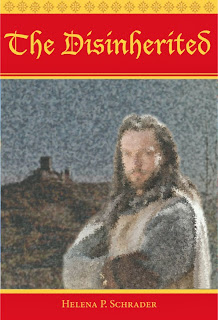Here is a fourth excerpt:
Lady Adèle’s screeching voice woke Julienne. From a
fitful sleep on her pallet, she roused herself in the pitch dark of the tower
room. “Julienne! Julienne!” the old woman screamed, as if she were being
assaulted.
Julienne
flung back her covers with a sigh and stood. “I’m coming, my lady.” The tiles
were cold under her bare feet. She looked for her slippers, but the old woman
was howling more furiously. “Julienne! Come this instant!”
Julienne
abandoned the search for her slippers and went to the high bedside. “My lady?”
“The
bedpan, you stupid girl! Why else should I wake you in the middle of the night?”
There was
no point remarking that she often woke Julienne because she wanted something
else: a potion to ease the pain in her crippled legs, or something to quench
her thirst, or even a snack. Resignedly, Julienne took the bedpan from under
the bed and held it under the old woman. When she was finished, she emptied it
in the chamber pot, washed her hands in the bowl beside the garderobe, and then
returned to her thin pallet.
She
listened to the old woman snoring and felt the light of dawn crawl slowly up
the eastern sky. Another day was about to begin. It would soon be sixteen years
since she had come here. Sixteen years of sleeping on the floor of this woman’s
chamber. Sixteen years at her beck and call. Sixteen years of servitude …
Julienne
felt deadly tired. She wished she could go back to sleep, but no matter how she
tossed or turned, she found herself on edge and strangely nervous. The stale
air in the chamber oppressed her, and she decided that fresh air would do her
good. Stealthily she rose and dressed herself. She then took her cloak off a
hook on the wall and slipped her feet into soft leather shoes. Carefully she
pulled the door open and started down the spiral stairs, past the chamber where
their curious guest slept, and out onto the wall walk.
The sky
was now decidedly gray, even faintly pink in the east, and around her the
towers stood out in sharp silhouette. Then a part of the wall before her moved
and she gave a cry of alarm.
“Don’t
worry; I only rape women after noon.”
The hair
stood up on the back of her neck, and she turned to flee back into the hall.
“I’m
sorry.” His voice followed her, and she stopped and turned back.
“Why do
you say things like that?”
She could
see him shrug. “I only say out loud what people are thinking.”
“I was just
startled. I didn’t even know it was you.”
Gerard considered
her. Her hair had come half out of its braid and hung in soft loops beside her
face, with one wisp falling across her cheek. With surprise, he registered that
she was not so bad-looking after all. Yes, her nose was pointed and her lips
thin, but she had wide-set eyes under arching eyebrows, high cheekbones, and a
lofty forehead. “You too are from the Languedoc,” he said at last. “I hadn’t
expected that. I thought Thury would have his own people around him, but almost
everyone is from hereabouts, it seems.”
“I am
from the Minervois,” Julienne found herself saying. How long had it been since
she admitted that, remembered that?
She saw
his head jerk. “Were you at Minerve?”
She
swallowed. Oh, God, why had she started this? Her heart was beating against her
chest, and now she remembered she had had the nightmare again. That was why she
had slept so poorly. “Yes,” she managed.
“You were
there,” Gerard asked in horror, “during the siege? But you must have been a
child.”
“I was
nine.”
Gerard
cursed himself. How could he have mocked her with a threat of rape? “You weren’t―molested―surely
not even they―” He couldn’t finish. He knew it had happened. He knew it had
happened more than once. But Minerve had surrendered. Its citizens should have
been immune ….
“No,” she
managed tightly. “I was―lucky.”
Read more: Buy



